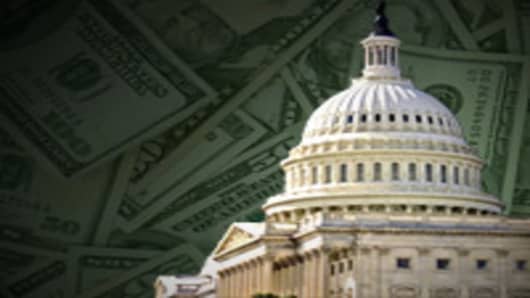The Super Committee's failure to come to an agreement on significant deficit reduction—and the possibility it may undo the automatic $1.2 trillion in budget cuts—is risking another U.S. debt downgrade, a 10 percent drop in stocks and a decline in the US dollar, analysts say.
“Failure to reach agreement on at least the minimum required savings will reflect poorly on Congress and the S&P 500 could fall by 10 percent to 1100,” said David Kostin, Goldman Sachs equity strategist, in a note. “The wide range of possible outcomes on both the super committee process and the unstable political economy in Europe drives our view that investors should assume the worst while hoping for the best.”
While Wednesday is the official deadline, today is the effective deadline since the Congressional Budget Office would need time to evaluate a proposed solution. But after a weekend of tough rhetoric from both sides, analysts don’t believe there’s a chance for a grand bargain of $3 to $4 trillion. Worse, they said, the committee may put in place a workaround on the $1.2 trillion so-called sequestration.
“Congress will have to grapple with either $1.2 trillion in sequestration falling evenly across non-homeland security defense spending and the rest of the budget or developing some form of work-around to sequestration legislatively, talk of which could stir concerns of another rating downgrade,” wrote Larry McDonald of McDonald Advisory Group and DCTripwire.com.
Stocks were poundedto start a shortened holiday week in the U.S., with the Dow Jones Industrial Average losing, at one point, more than 300 points. Many blamed the complete lack of bipartisan progress by the Joint Legislative Committee.
Investors thought that the automatic cuts of $1.2 trillion—which were agreed upon as motivating factor for the Super Committee following the debt ceiling debacle this summer— would at least keep the market and debt agencies at bay until the bigger issues could be tackled next year. That may not be the case.
“Even with the automatic cuts coming into place, the U.S. is facing a rising debt to GDP ratio,” said Daniel Clifton, a policy strategist with Strategas Research Partners, in a note to clients. “In light of the failure of the Super Committee, questions will legitimately be raised whether Congress can deliver on the remaining $2 trillion of savings needed to stabilize the U.S. debt to GDP ratio.”
On the possibility of the Super Committee punting the automatic cuts into next year, Clinton added: “We would expect further downgrades, a first downgrade from Moody’s and Fitch and possibly a second downgrade from S&P.”
Most disconcerting to investors though, would be a significant drop in the dollar , which has sustained a safe haven bid against the euro in light of a Greece bailout and rapidly increasing Italy funding costs. The dollar gave up most of its gains against the Euro Monday by midday.
“Our base case is the Super Committee agreeing on $1.2 trillion of cuts or a smaller sum with the rest taken care of by automatic cuts,” wrote David Woo, head of global rates and currencies research at Bank of America Merrill Lynch. “Should the Super Committee remain deadlocked and propose nothing, we would expect the U.S. dollar to come under moderate selling pressure of 1-2 percent.”
You know things are pretty bad when Washington D.C. is seen by the FX markets as more dysfunctional than a region which just had two new governments (Greece, Italy) installed.
For the best market insight, catch 'Fast Money' each night at 5pm ET, and the ‘Halftime Report’ each afternoon at 12:00 ET on CNBC. Follow @CNBCMelloy on Twitter.
______________________________________________________
Got something to say? Send us an e-mail at fastmoney-web@cnbc.com and your comment might be posted on the Rapid Recap! If you'd prefer to make a comment, but not have it published on our Web site, send your message to fastmoney@cnbc.com.



